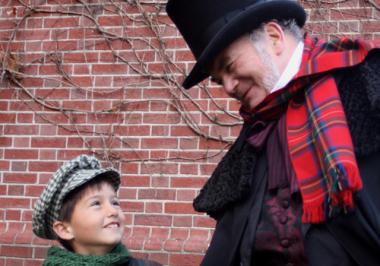After a few weeks spent getting up to speed—auditions, rehearsals, juggling student schedules, all that backstage stuff—four of the Five Colleges’ fall theater seasons are poised to open. Over the next three weekends, we’re in for an absurdist comedy that skewers the booboisie, a docudrama that pierces the underbelly of minimum-wage America, and two world-premiere adaptations of classic works.
First up, this weekend at UMass comes Love the Doctor, the first-ever English translation of El Amor Medico by the Spanish Golden Age dramatist Tirso de Molina. The satirical comedy centers on Jeronima, a strong-willed young woman in a man’s world, who uses deception and disguise to achieve her ambition of becoming a physician. The translation, by grad students Sarah Brew and Josephine Hardman, renders the text in modern American while retaining the 17th-century Spanish context (545-2511, umass.edu/theater, for tickets and info).
The other premiere is 2 Washington Square, a new dramatization of Henry James’ novella, coming to Amherst College Oct.27-29. In the 1940s the book was adapted as a stage play and Hollywood movie titled The Heiress. Now Amherst-based playwright Constance Congden has reimagined the book’s father-daughter battle of wills, updating it from the 1840s to the early 1960s, on the cusp of America’s youth and feminist revolutions (542-2277, amherst.edu/go/performance).
Next week two more shows hit campus stages, including Nickel and Dimed at Smith College, a co-production of Smith’s Theater Department and New Century Theatre. It’s an adaptation of Barbara Ehrenreich’s deep-cover investigative book, for which she doffed her middle-class identity and creature comforts to work in a series of low-wage jobs, emerging with a scathing expos? of what life is like for the working poor (585-2787, smith.edu/smitharts).
Also next weekend, Jack, or The Submission plays at Mount Holyoke College. This fractured farce by Eugene Ionesco, satirical master of the absurd, turns a domestic drama on its head with dreamlike non sequiturs and zany incongruities (my favorite line comes when one character gets into a snit and declares, “I’m packing my bags and you’ll never see me again except mealtimes”) that lead to a gradual demolition of language itself.
I sat in on a rehearsal last week and chatted with the director, Mount Holyoke senior Bryna Turner, who said she finds absurdist theater “particularly hilarious.” The title character is a moody youth who’s pestered by his family to conform and bullied into an arranged marriage to the daughter of friends—whom he rejects on the grounds that she’s “not homely enough.”
Turner said she’s attracted to the playwright’s interest in “the traps of language. Jack’s family uses language against him, making him say things that don’t mean anything. All of language is some sort of code that is trapping us, but we don’t know it. It’s the Ionesco plague.”
Following Mount Holyoke’s usual practice, the cast is all women. Turner has folded that choice into the play’s topsy-turvy context by casting “the two ‘girliest’ people—they’re both tiny and blonde—in the roles of the fathers.” She’s also amused at the timing of the production: a deconstruction of the ultimate dysfunctional family, performed on the college’s Family Weekend (538-2406, mtholyoke.edu/acad/theatre/season.html).



